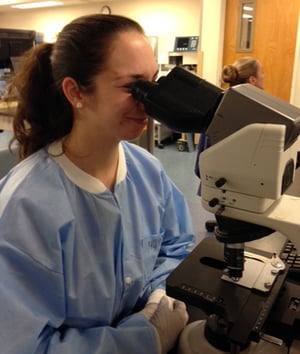 CHALLENGE
CHALLENGEPost Baccalaureate Certificate in Clinical Laboratory Science
Overview of the Program
This program is suited for individuals who have a BS in biology, chemistry or a related science. Applicants with a baccalaureate degree with pre-requisite course work from a regionally accredited, degree-granting institution who have successfully completed all prerequisite courses are eligible for entrance, subject to the approval of the Program Director.
Required Course work includes:
- Human Physiology (4 credits)
- Genetics (4 credits)
- Microbiology (4 credits)
- General Chemistry I and II (8 credits)
- Organic Chemistry I and II (8 credits)
- Biochemistry (4 credits),
- College Algebra, Pre-Calculus or Calculus (3 credits)
- Statistics (3 credits)
- Cellular Molecular Biology (4 credits)
The Biology/Clinical Laboratory Science (CLS) program at Neumann University has an excellent reputation in the educational and laboratory communities, and our graduates have a strong record of professional success.
The Biology/CLS program prepares professionals who are competent to perform and interpret laboratory tests, and to explain the appropriate use and meaning of laboratory tests to other health-care professionals and to patients.
The Biology/CLS track consists lecture and student laboratory courses at the University followed by a 16- week clinical practicum completed in the laboratories of medical centers, such as Crozer-Chester, Delaware County, VA of Philadelphia, Einstein, Cooper Medical and Mainline Health System. The extensive time students spend in the clinical environment allows them to develop a high degree of technical and professional competency by the time they complete the program.
BS degree graduates in biology or chemistry who complete the program are qualified to take the Medical Laboratory Scientist (MLS) examination from the American Society for Clinical Pathology Board of Certification (ASCP-BOC) and be certified as Medical Laboratory Scientists.
Overview of the Profession
Clinical laboratory science is related to the prevention, diagnosis, and treatment of disease. It combines the challenges of medicine, the basic sciences of biology and chemistry, and the clinical sciences into a very satisfying professional career. The major clinical sciences are medical microbiology, clinical chemistry, hematology, immunohematology and molecular diagnostics.
Clinical Laboratory Scientists function as detectives, investigating and determining the causes of diseases. They perform routine and complex analyses, utilizing the latest in biomedical instrumentation and molecular diagnostic techniques. Clinical Laboratory Scientists perform a variety of laboratory tests, ensure the quality of the test results, explain the significance of laboratory tests, evaluate new methods and study the effectiveness of laboratory tests. Examples of laboratory tests performed by Clinical Laboratory Scientists include:
- the detection of the abnormal cells that cause leukemia
- the analysis of cardiac enzyme activity released during a heart attack
- the identification of the type of bacteria causing an infection
- the detection of DNA markers for genetic diseases
The profession of Clinical Laboratory Science is dynamic, continually changing to reflect scientific and medical discoveries. Due to their educational background, graduates enjoy a wide range of career opportunities. CLS graduates can be found working as:
- Clinical laboratory generalists in hospitals, clinics or commercial laboratories.
- Clinical laboratory specialists working in areas such as microbiology, hematology, blood bank, chemistry, molecular biology/DNA, histocompatiblity, virology, immunology/serology, stem cell/bone marrow labs and flow cytometry.
- Clinical laboratory supervisors, managers, administrators and directors.
- Quality assurance/quality management specialists in hospitals or industry (e.g. pharmaceutical quality operations).
- Technical representatives, sales representatives or research and development specialists in laboratory industries.
- Clinical Research Associates (CRA) in clinical trials organizations.
- Research technologists or research supervisors/coordinators in academic medical centers.
- Laboratory information systems specialists.
- Infection control officers in hospitals or clinics.
- Educators for employee training programs or formal academic programs.
- Consultants for Physician Office Laboratories.
- Forensic scientists in governmental or commercial laboratories.
- Clinical laboratory scientists in veterinary laboratories.
Accredited by the National Accrediting Agency for Clinical Laboratory Science (NAACLS), the Biology/Clinical Laboratory Science course requirements are housed within the School of Arts and Sciences that culminates in a Clinical Laboratory Science certificate. The BIO/CLS track has received full accreditation from the National Accrediting Agency for Clinical Laboratory Science (NAACLS), 5600 North River Road, Suite 720; Rosemont, IL, 60018.
Contact information
Sandra M. Weiss EdD, MLS(ASCP)CM
Professor and Program Director of CLS
Arts and Sciences
Phone: 610-558-5607
Email: sweiss@neumann.edu
Graduate Admissions
Phone: 610-361-5208
Email: gradadultadmiss@neumann.edu






